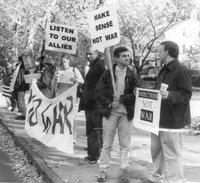Throwing in the cowl, or kicking the habit?
The santa fe trail has been a little quiet for the last couple of weeks. Sorry about that. There are a few reasons - one is that I've been busy chatting and posting on other blogs a bit, as well as being busy with assignments and stuff. Another reason is best summarised by my previous post - just wanting to make sure thinking doesn't become an idol.
Here's a few thoughts that are coming together in my head at the moment. Firstly, there's been a roaring discussion on what has been call "Network Church" over on Boxologies - worth a read, especially if you're going to join us for Coffee Shop Theology this weekend. Secondly, I've been writing an essay on Charles Spurgeon and his involvement in the "Down Grade Controversy" of the late 1800s. No, I hadn't heard of it either. Johnny does a good summary (as well as some good reflection) here.


Here's a few thoughts that are coming together in my head at the moment. Firstly, there's been a roaring discussion on what has been call "Network Church" over on Boxologies - worth a read, especially if you're going to join us for Coffee Shop Theology this weekend. Secondly, I've been writing an essay on Charles Spurgeon and his involvement in the "Down Grade Controversy" of the late 1800s. No, I hadn't heard of it either. Johnny does a good summary (as well as some good reflection) here.


So what's the connection?
Here are my questions: is the move away from congregationalism (represented by network church) the final decisive step in kicking our addiction to empire-building (as has been suggested)? Is it protest? Or is is a retreat of some sort; even a surrender to the individualism of our age?
Spurgeon (at least according to one historian I read) seems to have chosen the path of protest. When he left the Baptist Union, he formed no alternative denomination and generally dissuaded people from following him. In a sense he made a (quasi-monastic?) protest rather than seek to remain in the BU and critically engage with the "down grade" in an effort to reform.
All well and good, and protest is often necessary, but the problem was that he seems to have paved the way for the reactionary (protest) Fundamentalism of the 1920s, and the equally saddening (protest) theological liberalism - both of which were totally modernist responses and still cause us pain today. I wonder what would have happened if Spurgeon had stayed in the BU and engaged more constructively with the rising liberalism. Would both sides have found a less reactionary path?
In protesting against anything (whether the congregation, or the modernist church status quo - a la emergent) there seems to be this danger of polarization. God forbid that I should become an Emergent Fundamentalist, or a Network Fundamantalist, or a Monastic Fundamentalist - and (worse) that those who follow me would entrench this further.
Here's a comment from Gibbs and Bolger's new book: "People are both hungry for relationships and yet at the same time ill prepared for the costs involved. In a culture in which casual relationships or contractual relationships are the norm, it is difficult to build relationships on deep foundations that can survive disagreements and disappointments. People are more prone to walk away when the going becomes difficult than to work through a crisis to the point where a new depth of understanding is reached."
This is a challenge to us all, whether networky types, urban monks, or emergent churches. So there's the thing on my mind as I look for a job after graduation - protest or reform? In the words of the Clash: "Should I stay or should I go?"
Here are my questions: is the move away from congregationalism (represented by network church) the final decisive step in kicking our addiction to empire-building (as has been suggested)? Is it protest? Or is is a retreat of some sort; even a surrender to the individualism of our age?
Spurgeon (at least according to one historian I read) seems to have chosen the path of protest. When he left the Baptist Union, he formed no alternative denomination and generally dissuaded people from following him. In a sense he made a (quasi-monastic?) protest rather than seek to remain in the BU and critically engage with the "down grade" in an effort to reform.
All well and good, and protest is often necessary, but the problem was that he seems to have paved the way for the reactionary (protest) Fundamentalism of the 1920s, and the equally saddening (protest) theological liberalism - both of which were totally modernist responses and still cause us pain today. I wonder what would have happened if Spurgeon had stayed in the BU and engaged more constructively with the rising liberalism. Would both sides have found a less reactionary path?
In protesting against anything (whether the congregation, or the modernist church status quo - a la emergent) there seems to be this danger of polarization. God forbid that I should become an Emergent Fundamentalist, or a Network Fundamantalist, or a Monastic Fundamentalist - and (worse) that those who follow me would entrench this further.
Here's a comment from Gibbs and Bolger's new book: "People are both hungry for relationships and yet at the same time ill prepared for the costs involved. In a culture in which casual relationships or contractual relationships are the norm, it is difficult to build relationships on deep foundations that can survive disagreements and disappointments. People are more prone to walk away when the going becomes difficult than to work through a crisis to the point where a new depth of understanding is reached."
This is a challenge to us all, whether networky types, urban monks, or emergent churches. So there's the thing on my mind as I look for a job after graduation - protest or reform? In the words of the Clash: "Should I stay or should I go?"














